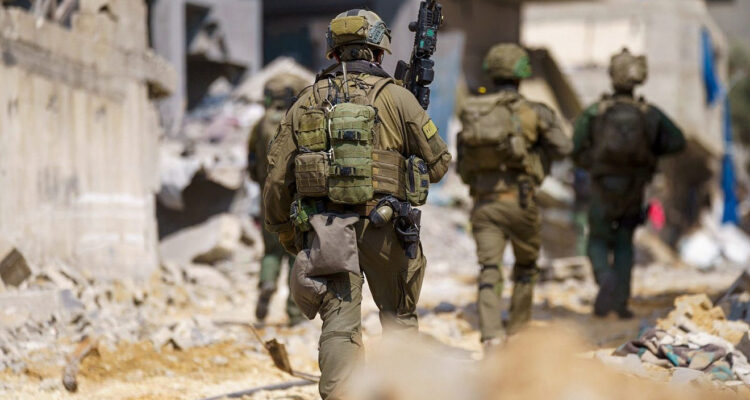Israel has to throw every human and material resource into the fight that will continue long after Hamas has been dismantled in Gaza.
By Hugh Fitzgerald, Frontpage Magazine
Israel is now fighting a multi-front war, with Hamas in Gaza, Hezbollah in Lebanon, the Houthis in Yemen, Palestinian terrorists in Judea and Samaria, Israeli Arabs opposed to the Jewish state, Muslim Brotherhood members and ISIS remnants in the Sinai, and the sinister state that supports, supplies, and directs Hamas, Hezbollah, and the Houthis — the Islamic Republic of Iran.
Israel is now, and for many years to come, will be fighting for its very existence, but, argues David Weinberg, the Israeli government still has not come to grips with the magnitude and duration of the conflict, and has not called for an “emergency mobilization” of the entire population, as he believes it must.
More of Weinberg’s analysis, and his insistence that Israel be put on a “wartime footing,” can be found here:
“Brace for impact: As Hezbollah escalates in North, we must prepare for emergency – opinion,” by David M. Weinberg, Jerusalem Post, June 22, 2024:
A cold, calculated analysis of Israel’s strategic situation will reach the conclusion that this country faces a decade of tough warfare on seven different fronts, mainly against Iran and its proxy armies.
Enemy armies and militias are entrenched on Israel’s borders, with Iran actively arming and seeking to radicalize Palestinians in Judea and Samaria, as well as in Jordan.
Full-scale war with Hezbollah in Lebanon, which is two days or two years away at most, will be an earth-shattering event in particular, bringing inevitable destruction of unprecedented proportions to civil infrastructure in Israel (as well as in Lebanon).
Neither the Israeli military nor home front is sufficiently geared to handle this grim reality.
Therefore, the government of Israel must embark on an emergency effort to significantly strengthen the IDF, and to mobilize the public in preparing for long-term struggle in wartime conditions.
This requires the enactment of punishing economic decisions and a change of mindset, led by leaders with both grit and vision.
I believe that the Israeli public instinctively understands the dramatic inflexion point where this country now stands and the sacrifices that yet will be required to guarantee the country’s very existence – beyond the enormous sacrifices of people and materiel that already have been made over the past eight months.
And I believe that the Israeli public, young and old across all partisan lines, is yearning – screaming! – for national leadership that will motivate it to participate in an escalating national war effort, despite the severity of the costs involved….
It is time to raid the high schools, university campuses, and senior citizen homes for manpower; to press the entire Israeli public, young and old of all hues and stripes, into industrial and emergency service.
New factories and new rescue/response brigades need to be staffed by every able body. This inevitably will have to include segments of Israeli society that currently are underrepresented in industry and military.
Weinberg is alluding here to both the Haredi Jews and Israeli Arabs. Both groups are currently exempt from military service. This has to end.
The Haredi Jews constitute 25% of the Jewish population, and in twenty years will be 40%, but they have been permitted since the establishment of the state to avoid military service.
They argue that in devoting themselves entirely to religious study, they are keeping the culture of Judaism alive.
Further, by mixing with secular Jews in the military, Haredi Jews might lose some of their commitment to such study.
As for Israeli Arabs, Israel is their country, too, and they should be obligated to help it in time of need, if not by serving in the military, then by performing, for the same wages that soldiers receive, and for the same length of time as draftees serve, other kinds of service.
Such as working as nurses and hospital orderlies, in industrial plants, in education, agriculture, childcare, and elder care.
Weinberg’s call for putting Israel on a wartime footing — something it has not yet done — is almost certainly right.
A country facing a seven-front war has to do more than mobilize 360,000 reservists to fight.
It has to throw every human and material resource into that fight that will continue long after Hamas has been dismantled in Gaza.
Israel has to be willing to spend tens of billions of dollars more on its military each year, and to call up 50,000 more soldiers from the ranks of the Haredi, who currently do not serve.
It needs to impose a duty of national service on Israel’s Arab population. Israeli Arabs should be encouraged to volunteer for the IDF, but those who do not should be required to spend the same amount of time (two years and six months for men, two years and two months for women), and receive the same wages, as army recruits, performing their national service.
That service might take the form of working in hospitals and schools, or in energy plants, or weapons factories — wherever the need is determined by the government to be the greatest.
This emergency mobilization would be similar to what the fledgling state of Israel did in 1948, with a total population of 600,000 Jews, many of them fresh off the boats from European DP camps, when it threw men and women, the young and the old, some of whom had just a few weeks of training, into battle against the regular armies of five Arab states, and despite an arms embargo, managed to defeat them.
Something akin to that national girding of the loins needs to be put in place today.
Weinberg is optimistic that Israelis will summon up the energy, and the spirit of self-sacrifice, necessary for such a massive collective effort. I hope he’s right.





